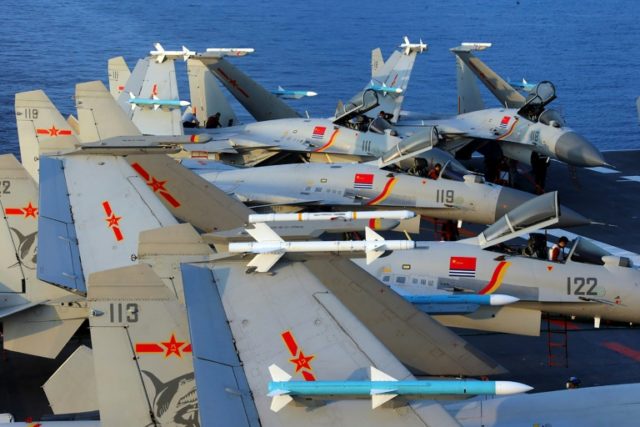A bipartisan bill called the Asia Reassurance Initiative Act (ARIA) seeks an addition $1.5 billion in annual defense spending for the next five years, for a total of $7.5 billion, to counter Chinese influence in the region.
The funds would reinforce U.S. defense commitments to regional allies, preserve freedom of navigation throughout the Indo-Pacific, enhance cybersecurity, protect U.S. intellectual property from theft, and develop a stronger commercial presence in Asia. The latter measure is no doubt intended to counter the influence China is building through its One Belt, One Road infrastructure project.
$10 million of the annual funding is earmarked for “freedom of information efforts in North Korea.” The bill calls for stronger American efforts against slavery and human trafficking, offenses of which North Korea is an enthusiastic perpetrator.
Military outlays in the bill include “support for regular arms sales to Taiwan” and the enhancement of “diplomatic and defense contacts between Washington and Taipei.” The authors also expressed a keen interest in developing a stronger relationship with China’s rival India.
“With China’s increasingly assertive rise, it is critical that the United States reaffirm our commitment to securing a free and open Indo-Pacific region through enhanced cooperation with our democratic partners,” Sen. Marco Rubio (R-FL) said when introducing the bill in late April.
“This important piece of legislation will do just that by creating a framework for U.S. policy throughout the Indo-Pacific region on several key areas including trade, promotion of human rights, counterterrorism programs, and many other national security priorities. To ensure the arc of history bends toward a free and open Indo-Pacific, regional democracies will have to cooperate more, which is precisely what this legislation aims to foster,” Rubio said.
“We believe that with this bipartisan vision for our Asia policy, the Administration and Congress can be united on implementing a long-term strategy that will benefit American national security interests, promote American businesses and create jobs through trade opportunities, and project American values of respect for the human rights and freedom that have made the America the shining city upon a hill,” said co-sponsor Sen. Cory Gardner (R-CO).
“The rules-based international order – absolutely fundamental to global peace and security – faces significant challenges in Asia, arguably the most consequential region for the United States,” said Democrat co-sponsor Ed Markey (D-MA). “This legislation reflects the region’s importance by addressing key challenges, including the peaceful denuclearization of North Korea, prioritizing reasonable and effective nonproliferation policies, promoting the freedom of navigation and overflight in maritime Asia, and defending human rights and the respect for democratic values.”
Sen. Ben Cardin (D-MD) praised the bipartisan spirit of cooperation behind the bill and predicted America’s relations with “Asian allies, partners, and adversaries” would dominate the coming century.
“We need a clear set of strategic policies to bolster our national security and economic interests, framed in the values that define who we are – democratic principles, human rights, and the rule of law. I’m pleased this legislation places such a high premium on those priorities,” Cardin said.
The four are ranking members of the Senate Subcommittee on East Asia, the Pacific, and International Cybersecurity Policy. At a press conference on Tuesday, Gardner credited Senate Armed Services Committee Chairman John McCain (R-AZ) with providing inspiration for the bill.
“This is not a new concept, and this is as close as we’ve come to an Asia-Pacific security initiative,” said Gardner.
At Tuesday’s subcommittee hearing on the ARIA, Assistant Secretary of Defense for Asian and Pacific Security Affairs Randall Schriver applauded the objectives of the bill and said they align with Defense Department policy goals.
“With the help of Congress and the funding provided, we’re trying to build a force that’s appropriate to the longer-term challenges with China’s military modernization program, and trying to work with allies and partners to make sure they are adequately equipped and prepared for those long-term challenges,” he said.
Schriver noted that the contest against China is a “competition of ideas and values and interests” where the “most significant and influential countries in Asia” support the ideals of the United States more than China.

COMMENTS
Please let us know if you're having issues with commenting.